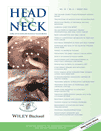Intrapericardial paraganglioma associated with succinate dehydrogenase complex subunit C mutation syndrome
Abstract
Background
Paragangliomas are benign neoplasms of neuroendocrine origin. It is estimated that from 20% to 50% of these tumors are familial. Mutations in the succinate dehydrogenase (SDH) gene family have been found to be responsible for a significant percentage of familial paragangliomas.
Methods
A 33-year-old man who was found to have 3 synchronous primary tumors including a catecholamine-secreting intrapericardial paraganglioma is presented.
Results
Genetic workup diagnosed this patient with an underlying germ-line mutation in the succinate dehydrogenase complex subunit C (SDHC) gene; consistent with a diagnosis of hereditary paraganglioma/pheochromocytoma syndrome (PGL/PCC). Current knowledge regarding the clinical implications of an SDHC gene mutation is reviewed.
Conclusion
Modern molecular techniques have identified that a significantly greater proportion of paragangliomas are due to underlying hereditary conditions than was previously thought. Appropriate screening in these individuals and their immediate family members may allow for early tumor diagnosis and improved disease outcomes. © 2012 Wiley Periodicals, Inc. Head Neck, 2013




